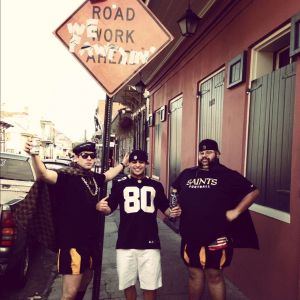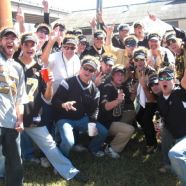The Tribal Roots of Team Spirit
An earlier version of this article was published on October 13, 2011, in “How Risky is It, Really? Why Our Fears Don’t Always Match the Facts” on the Psychology Today blog.
They’re BIRGing big time in San Francisco. The 49ers are hot, the Giants just won the world series. Not so much in New Orleans, still reeling from the “bounty-gate” scandal, and where people are CORFing all over the place after an 0-4 start and a tough loss to the 49ers. This may seem like rooting for the home team, but it’s actually about something WAY deeper than sports, that bears on everything we do as social/tribal animals. We may like to think that “it’s just a game”, but rooting for our teams is tied to nothing less than our very drive to survive.
From Sacramento to San Jose to the Golden Gate, happy sports fans in the Bay Area are Basking In Reflected Glory. The cry is “WE won.” And from Lafayette to Pensacola, suffering Saints fans are Cutting Off Reflected Failure. They moan about how the Saints lost with “THEY lost.” Note the pronouns. Winners are celebrated in the first person “WE”. They BIRG. Losers CORF, and distance themselves from failure with the third person “THEY”. We associate with winners, and disassociate from losers.
The phenomenon was first formally noted by Robert Cialdini et. al. in a famous paper in 1976 “Basking in Reflected Glory: Three (Football) Field Studies.” Cialdini and colleagues kept track of the apparel of students in psychology classes at seven major universities on the days after football games. On the days after the local team won, far more students were dressed in the tribal—oops, I mean, the team’s colors—than after a loss. And when asked to verbally described the results of the game, far more students said “WE won” after a win, and “THEY lost’ after a defeat.
What’s up here? Clearly these people weren’t consciously thinking about which pronoun to use. This behavior, and language, comes from someplace deeper, more instinctive, more ancient, more tribal…someplace that I would suggest is tied to nothing less than the deepest instinctive imperative of all, to survive. After all, we are social animals. We depend on the tribe for our safety and well-being. When the lion attacks, as a group we’ve got a shot. Alone, we’re lion chow. When our tribe is doing well (economically, militarily, public health, whatever…), our chances go up. When it’s doing poorly, our chances go down. So it feels good to belong to a winning tribe, and not so good—threatening, in fact—to belong to a group that’s losing.
Think about all the ways we support the tribe. We subconsciously choose our views on many issues so they match the views in the groups we most strongly identify with, a theory called Cultural Cognition. We vote for our tribe (political party). We fight to the death for our tribe in everything from gang wars to wars between nations (tribes). In fact, if you look at a lot of the wars and mass violence in recent history they were about nothing BUT tribe; Protestants v. Catholics in Northern Ireland, Serbs v. Croats v. Muslims in the Balkans, Hutus and Tutsis in Rwanda.
 Sports are only less violent surrogates of precisely the same human need, to belong to a tribe that’s doing well because as the tribe’s chances go, so go yours. Think about the trappings of sports; the teams are your surrogate warriors, wearing tribal uniforms, the battle grounds (stadia) decorated with tribal flags (banners) and tribal emblems (often fierce animals or warrior figures), the fans painting their faces in tribal/team colors and wearing tribal/team clothing, chanting tribal chants (team songs), fighting long-standing tribal rivalries). The warriors (your team) fight to defend YOUR territory (HOME field,), and you root and cheer and do all sorts of superstitious stuff that you think will affect the outcome on a playing field you in fact have ZERO influence over, and your emotions and actual body chemistry go up, or down, depending on the outcomes. And if everything goes as hoped, the season ends with a championship capped by huge civic rallies in which everyone chants and screams “WE won!”
Sports are only less violent surrogates of precisely the same human need, to belong to a tribe that’s doing well because as the tribe’s chances go, so go yours. Think about the trappings of sports; the teams are your surrogate warriors, wearing tribal uniforms, the battle grounds (stadia) decorated with tribal flags (banners) and tribal emblems (often fierce animals or warrior figures), the fans painting their faces in tribal/team colors and wearing tribal/team clothing, chanting tribal chants (team songs), fighting long-standing tribal rivalries). The warriors (your team) fight to defend YOUR territory (HOME field,), and you root and cheer and do all sorts of superstitious stuff that you think will affect the outcome on a playing field you in fact have ZERO influence over, and your emotions and actual body chemistry go up, or down, depending on the outcomes. And if everything goes as hoped, the season ends with a championship capped by huge civic rallies in which everyone chants and screams “WE won!”
No. The athletes won. You watched. But it feels like YOU won, because you need to feel like your tribe is successful and dominant, because that literally makes you feel safer. (And if your team lost you go out and trash the city like fans in Vancouver after the Stanley Cup loss last year, or countless other fans in countless other ‘defeated’ cities. Or, worse, you violently attack fans of the other team…or the other tribe.)
As this is being written, the “WE won” BIRGing may be shifting to New York, where the New York Giants are in first place and the New York Knicks have one of the best records in the NBA, while Tennessee fans may soon be doing their BIRGing about basketball and CORFing about football. The stories about all this will run in the sports section, which will somehow separate these ‘pretend’ wars from the other things that separate us into groups, and create conflict…real, violent, destructive conflict. But BIRGing and CORFing is not much different from the polarized closed-minded antipathy people on the right and left feel toward each other, the virulent and often violent hatred people in the orthodox branches of various faiths feel toward people outside their sect, not much different from the antipathy Kikuyus in Kenya feel toward the Luo tribe or the violence between Pashtuns and other tribes in Afghanistan or the angry feelings people in so many nations have toward the people in other countries.
Auburn and Alabama Universities. Hatfields and McCoys. Palestinians and Israelis. They each have their own story line, but at their heart these conflicts, and BIRGing and CORFing, are all part of the same phenomenon. They represent the social human animal’s need for tribal affiliation and cohesion, a belonging which is vital to nothing less motivating than survival itself.
(Go, Patriots! “Kill” the Cowboys.)







